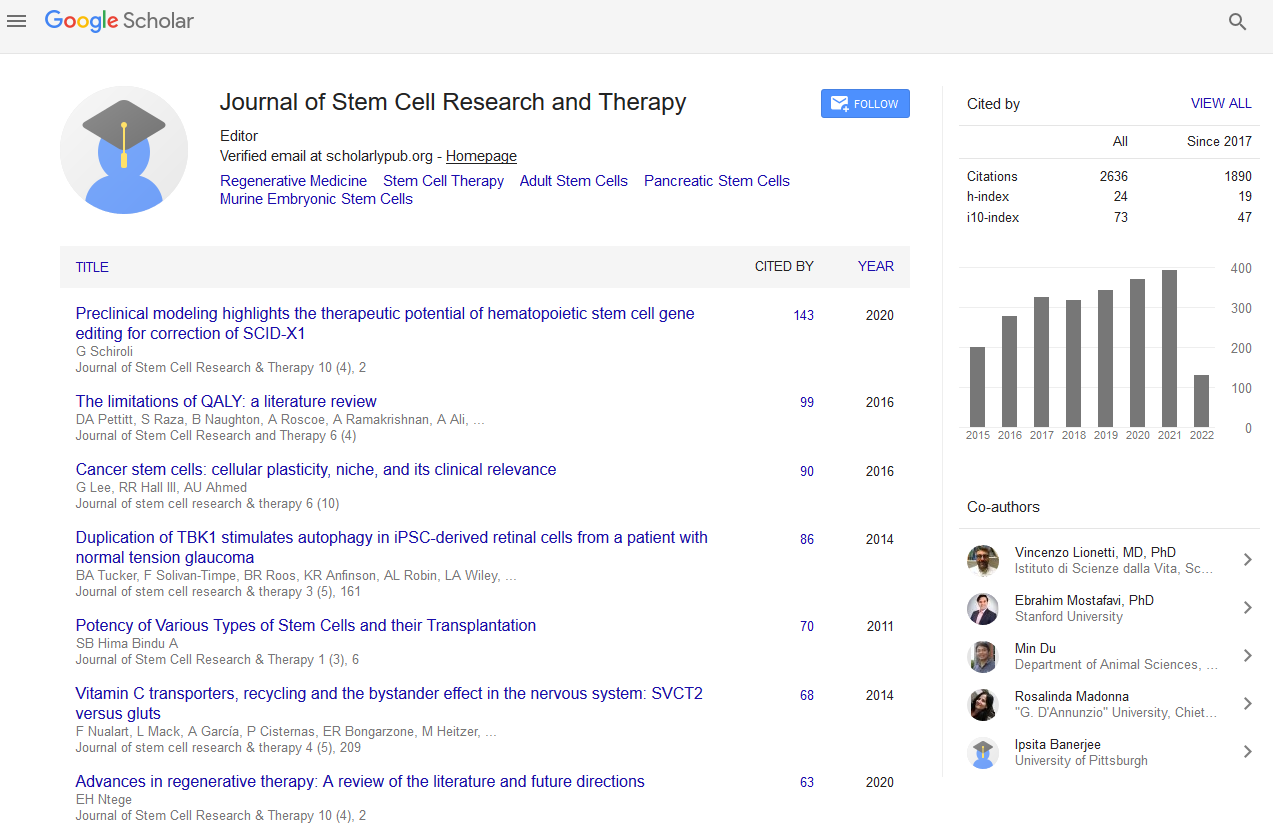Indexed In
- Open J Gate
- Genamics JournalSeek
- Academic Keys
- JournalTOCs
- China National Knowledge Infrastructure (CNKI)
- Ulrich's Periodicals Directory
- RefSeek
- Hamdard University
- EBSCO A-Z
- Directory of Abstract Indexing for Journals
- OCLC- WorldCat
- Publons
- Geneva Foundation for Medical Education and Research
- Euro Pub
- Google Scholar
Useful Links
Share This Page
Journal Flyer

Open Access Journals
- Agri and Aquaculture
- Biochemistry
- Bioinformatics & Systems Biology
- Business & Management
- Chemistry
- Clinical Sciences
- Engineering
- Food & Nutrition
- General Science
- Genetics & Molecular Biology
- Immunology & Microbiology
- Medical Sciences
- Neuroscience & Psychology
- Nursing & Health Care
- Pharmaceutical Sciences
Mesenchymal stem cells as gene delivery vehicle for successful islet transplantation
Ram I Mahato
Abstract:
Human islet transplantation has great potential to treat insulin dependent diabetes mellitus. Human bone marrow-derived mesenchymal stem cells (hBMSCs) can repair damaged islets and modulate immune responses. Co-expression of human hepatocyte growth factor (hHGF) and interleukin-1 receptor antagonist (hIL-1Ra) promotes revascularization and inhibits islet cell apoptosis. Therefore, we will determine whether hBMSCs expressing these genes can protect islets from immune and inflammatory destruction, and improve islet transplantation. We demonstrated strong binding affinity of hBMSCs to islets and protection of their viability and function. Transduction of hBMSCs with Adv-hHGF-hIL-1Ra protected islets from apoptotic cell death, helped maintain their 3D structures, and enhanced insulin secretion. Islet transplantation following reconstitution with Adv-hHGF-hIL-1Ra transduced hBMSCs into NOD-SCID mice reversed diabetes, with blood glucose levels to ≤ 200 mg/dl up to ≥100 days. In contrast, 40% of mice transplanted with islets alone showed reversal of blood glucose levels within three weeks, and all mice returning to ≥500 mg/dL at 30 days post-transplantation. There was significant insulin staining in islets co-cultured with Adv-hHGF-hIL-1Ra transduced hBMSCs. Our specific aims are to determine whether i) hBMSCs can protect and repair damaged human islets; and ii) co-expression of hHGF and hIL-1Ra by hBMSCs can synergistically improve islet survival and function after transplantation into humanized immunocompetent diabetic mice; iii) microencapsulation of hBMSCs-reconstituted human islets into barium chloride crosslinked alginate membranes can provide additional protection to islets from inflammatory and adaptive immune responses. The significance of this research is to achieve significant improvement in human islet transplantation.
Biography :
Ram I. Mahato is a Professor of Pharmaceutical Sciences and Biomedical Engineering at the University of Tennessee, Memphis, USA. He was a Research Assistant Professor at the University of Utah, Senior Scientist at GeneMedicine, Inc., and as a postdoctoral fellow at the University of Southern California, Washington University, and Kyoto University, Japan. He received PhD in Drug Delivery from the University of Strathclyde, UK and BS from China Pharmaceutical University. He has published 85 papers, five books, and six journal issues. He is a Feature Editor of the Pharmaceutical Research, AAPS Fellow, and Permanent Member of BTSS/NIH Study section.


